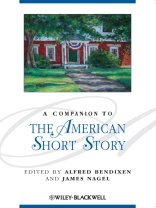A Companion to the American Short Story traces the
development of this versatile literary genre over the past two
centuries. Written by leading critics in the field, and edited by
two major scholars, it explores a wide range of writers, from Edgar
Allen Poe and Edith Wharton, Kate Chopin, and Charles Chesnutt at
the end of the nineteenth century. In the twentieth the
focus is on such important Modern writers as Ernest Hemingway,
William Faulkner, F. Scott Fitzgerald, and Richard Wright before
moving into the contemporary period with essays on Raymond Carver,
Saul Bellow, and Denise Chávez. Contributions with a
broader focus address groups of multiethnic, Asian, and Jewish
writers. All the essays set the short story in context, focusing on
the interaction of cultural forces and aesthetic principles.
The Companion takes account of cutting edge approaches to
literary studies and contributes to the ongoing redefinition of the
American canon, embracing genres such as ghost and detective
fiction, cycles of interrelated short fiction, and comic, social
and political stories. The volume also reflects the diverse
communities that have adopted this literary form and made it their
own, featuring entries on a variety of feminist and multicultural
traditions. This volume presents an important new consideration of
the role of the short story in the literary history of American
literature.
Inhoudsopgave
Notes on Contributors viii
Preface xiv
Acknowledgments xvi
Part I: The Nineteenth Century 1
1 The Emergence and Development of the American Short Story 3
Alfred Bendixen
2 Poe and the American Short Story 20
Benjamin F. Fisher
3 A Guide to Melville’s ‘Bartleby, the Scrivener’ 35
Steven T. Ryan
4 Towards History and Beyond: Hawthorne and the American Short Story 50
Alfred Bendixen
5 Charles W. Chesnutt and the Fictions of a ‘New’ America 68
Charles Duncan
6 Mark Twain and the American Comic Short Story 78
David E. E. Sloane
7 New England Local-Color Literature: A Colonial Formation 91
Josephine Donovan
8 Charlotte Perkins Gilman and the Feminist Tradition of the American Short Story 105
Martha J. Cutter
9 The Short Stories of Edith Wharton 118
Donna Campbell
Part II: The Transition into the New Century 133
10 The Short Stories of Stephen Crane 135
Paul Sorrentino
11 Kate Chopin 152
Charlotte Rich
12 Frank Norris and Jack London 171
Jeanne Campbell Reesman
13 From ‘Water Drops’ to General Strikes: Nineteenth- and Early Twentieth-Century Short Fiction and Social Change 187
Andrew J. Furer
Part III: The Twentieth Century 215
14 The Twentieth Century: A Period of Innovation and Continuity 217
James Nagel
15 The Hemingway Story 224
George Monteiro
16 William Faulkner’s Short Stories 244
Hugh Ruppersburg
17 Katherine Anne Porter 256
Ruth M. Alvarez
18 Eudora Welty and the Short Story: Theory and Practice 277
Ruth D. Weston
19 The Short Stories of F. Scott Fitzgerald: Structure, Narrative Technique, Style 295
Kirk Curnutt
20 ‘The Look of the World’: Richard Wright on Perspective 316
Mikko Tuhkanen
21 Small Planets: The Short Fiction of Saul Bellow 328
Gloria L. Cronin
22 John Updike 345
Robert M. Luscher
23 Raymond Carver in the Twenty-First Century 366
Sandra Lee Kleppe
24 Multi-Ethnic Female Identity and Denise Chávez’s The Last of the Menu Girls 380
Karen Weekes
Part IV: Expansive Considerations 389
25 Landscape as Haven in American Women’s Short Stories 391
Leah B. Glasser
26 The American Ghost Story 408
Jeffrey Andrew Weinstock
27 The Detective Story 425
Catherine Ross Nickerson
28 The Asian American Short Story 436
Wenying Xu
29 The Jewish American Story 450
Andrew Furman
30 The Multiethnic American Short Story 466
Molly Crumpton Winter
31 ‘Should I Stay or Should I Go?’ American Restlessness and the Short-Story Cycle 482
Jeff Birkenstein
Index 502
Over de auteur
Alfred Bendixen has taught at Princeton University, Texas A&M University, California State University – Los Angeles, and Barnard College. He is best known as the founder and Executive Director of the American Literature Association. His recent work focuses on the development of genre in a democratic society and includes The Cambridge Companion to American Travel Writing, co-edited with Judith Hamera (2009); A Companion to the American Novel, (Blackwell 2012); The Cambridge History of American Poetry, co-edited with Stephen Burt (2015); and The Centrality of Crime Fiction in American Literary Culture, co-edited with Olivia Carr Edenfield ( Routledge 2017).
James Nagel is the Eidson Distinguished Professor of American Literature Emeritus at the University of Georgia. From 2012 to 2018 he served as Resident Scholar at Dartmouth College. Early in his career he founded the scholarly journal Studies in American Fiction and the widely influential series Critical Essays on American Literature. Among his twenty-four books are Stephen Crane and Literary Impressionism, Hemingway in Love and War (which was made into a Hollywood film directed by Lord Richard Attenborough), The Contemporary American Short-Story Cycle, and Race and Culture in New Orleans Stories. He has published some eighty articles in the field, and he has lectured on American literature in seventeen countries.












